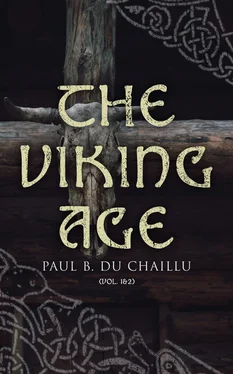CHAPTER VII.
THE SUCCESSORS OF ODIN OF THE NORTH.
Table of Contents
Njörd the successor of Odin—Frey succeeds Njörd—A great temple built at Uppsalir by Frey—The ship of Frey—Death of Frey—Frey’s death kept secret from the people—Freyja, the priestess—Fjölnir, the son of Yngvi Frey—Svegdir—Genealogies of the Norse chiefs from Odin Skjöld, the founder of the Danish branch of chiefs.
According to the sagas, after the death of Odin, Njörd of Nóatún became the ruler of the Swedes.
“Thereupon Njörd of Nóatún became ruler over the Swedes, and continued the sacrifices; the Swedes called him their dróttin (lord); he gathered taxes from them. In his days there was very good peace, and seasons were so good in every respect that the Swedes believed that Njörd ruled over good seasons and the wealth and welfare of men. In his days most of the Díar died, and all of them were afterwards burnt and sacrificed to. Njörd fell sick and died; he also let himself be marked (with a spear) before he died, as a token that he belonged to Odin. The Swedes burnt him, and wept very much over his mound” (Ynglinga, c. 11).
“Njörd of Nóatún then begat two children. His son was Frey and his daughter Freyja. They were beautiful in looks and mighty. Frey is best of the Asar. He rules the rain and the sunshine, and also has power over the growth of the ground. It is good to make vows to him for good seasons and peace. He also rules over men’s fortune in property.” (Gylfaginning, c. 24.)
In Vafthrudnismal Odin asks Vafthrudnir the origin of Njörd.
Odin.
Tell me …
Whence Njörd came
Among the sons of Asar;
He rules hundred-fold
Temples and altars
And he was not born among Asar.
Vafthrudnir.
In Vanaheim
The wise powers shaped him,
And gave him to the gods as a hostage;
At the doom of the world
He will come back again,
Home to the wise Vanir.
The Njörd who is related to have been punished by uncontrollable sadness for falling in love with Gerd and sitting on Odin’s high-seat is a mythical Njörd.
“A man was called Gýmir whose wife Orboda was of Berg (mountain) Risar kin. Their daughter Gerd was the most beautiful of all women. One day Frey had gone to Hlidskjalf 98and could see over all worlds. When he looked to the North he saw on a farm a large and fine house towards which a woman was walking. When she lifted her arms, opening the door, a light shone from them on the sea, and the air and all worlds were brightened from her. His great boldness in sitting down in the holy seat thus was revenged upon him, for he went away, full of sorrow. When he came home he did not speak or sleep or drink and no one dared question him. Then Njörd called to him Skirnir, the shoe-boy of Frey, and told him to go to Frey, address him and ask with whom he was so angry that he would not speak to men. Skirnir said he would go, though not willingly, as unfavourable answers might be expected from him. When he came to Frey he asked why he was so sad and did not speak to men. Frey answered that he had seen a beautiful woman and for her sake he was so full of grief that he would not live long if he should not get her. ‘Now thou shalt go and ask her in marriage for me and take her home hither whether her father is willing or not; I will reward it well.’ Skirnir answered that he would undertake this message if Frey gave him his sword. This sword was so good that it fought of itself. Frey did not fail to do this and gave it to him. Skirnir then went and asked the woman in marriage for him and got her promise that she would come after nine nights and keep her wedding with Frey. When Skirnir had told Frey of his journey Frey sang:
“Long is one night,
Long is another,
How can I endure three?
Often a month to me
Shorter seemed
Than one half of this wedding-night.”
(Later Edda, Gylfaginning, 37.)
After the death of Njörd, Frey, one of his sons, succeeded him as high priest of the sacrifices, and, according to tradition, built the great temple at Upsala, which became of great repute as a most holy place among the people of the North, who came from all parts of the country to assist at the sacrifices. The Sagas say that great Things were held there, all important quarrels settled, friendship sealed, and peace concluded between chieftains and countries.
“Frey took the realm after Njörd; he was called the dróttin of the Swedes, and took taxes of them. He was as well liked as his father, and in his days also were good seasons. Frey raised a large temple at Uppsalir, and had his head burgh (höfud stad) there; all his taxes, lands, and loose property he gave thereto. That was the beginning of the Uppsalir wealth, which has been kept up ever since.
“In his days the peace of Fródi 99(King in Denmark) began; then there were good seasons in every land. The Swedes attributed that to Frey. He was worshipped more than other gods, because in his days the people of the land became wealthier than before, on account of the peace and the good seasons. His wife was called Gerd, daughter of Gýmir; 100their son was Fjölnir. Another name of Frey was Yngvi; this name was long afterwards used among his kin as a name of honour, and his kinsmen were afterwards called Ynglingar. Frey fell sick; when he was near death they took counsel and allowed few men to see him; they made a large mound ready for him with a door and three holes. When Frey was dead they carried him secretly into the mound and told the Swedes that he was alive, and kept him there for three winters. They poured all the taxes into the mound, the gold through one hole, the silver through another, and the brass pennings through the third. Then peace and good seasons continued” (Ynglinga, c. 12).
“When all the Svíar knew that Frey was dead, and peace and good seasons continued, they believed it would last while Frey was in Svithjód, and would not burn him, and called him the god of the world (veraldar god), and sacrificed ever since chiefly to him for good seasons and peace” (Ynglinga, c. 13).
After the death of Frey, Freyja, the daughter of Njörd, became the priestess, and offered the sacrifices.
“Freyja upheld the sacrifices, for she alone of the godar was then living, and she became so renowned that all high-born women are called fruvor . 101Thus every woman is the freyja of her property, and she who has a household is hús-freyja 102(housewife). Freyja was rather many-minded (fickle); her husband was Ód; her daughters were Hnoss (costly thing) and Gersemi (precious thing); they were very beautiful, and the costliest things are called by their names” (Ynglinga, c. 13).
According to the Ynglinga, Yngvi Frey was the son of Njörd, and Fjölnir the son of Yngvi Frey. Fjölnir ruled over the Swedish and Upsala domain, and died in Zeeland. A strong friendship existed between him and Fródi the grandson of Skjöld, the son of Odin, and it was the custom of these two chiefs to visit each other.
“Fjölnir the son of Yngvi Frey then ruled over the Swedes and the Upsala-wealth; he was a powerful king, and peace-happy and season-happy. At that time Peace-Fródi was at Hleidra (Leire); they were friends and invited each other. When Fjölnir came to Fródi in Zeeland there was a great feast prepared for him, and people were invited to it from far and wide. Fródi had a large house; in it there had been a large vat, many feet high, held together by large timbers; it stood in the lower story, and there was a loft above in which there was an opening through which the drink could be poured in; the vat was full of mixed mead, 103a very strong drink. In the evening Fjölnir and his men were shown to their room on the next loft. In the night he went out on the svalir (a kind of balcony) to look for something; he was overcome with sleep and dead-drunk. When he returned to his room he walked along the balcony to the door leading into the next room, and there he missed his footing and fell into the mead-vat and perished” (Ynglinga, c. 14).
Читать дальше












